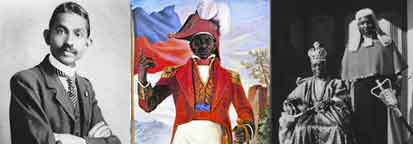Browsing Room, Knight Library
University of Oregon
Colonial Exchanges: Political Theory and the Agency of the Colonized
When European empires expanded outward to rule much of the world in the 15th to 20th centuries, they were not only engaged in a political project, but in an intellectual project as well. This conference examines the historical reception, revision, and redirection of European ideas by intellectuals in colonized societies. Presentations will focus on intellectuals in India, North Africa, the Caribbean, Sub-Saharan Africa, and the Philippines.
Issues to be examined include: ways in which indigenous resistance to colonialism impacted European thinking; ways in which the experience of European domination altered the political consciousness of the colonized; and ways in which the ideas of colonized intellectuals altered the views of their European counterparts. Especially interesting are moments in which intellectual alterations made distinct differences in practice, such as creating new patterns of resistance or social reform among the colonized, or by impacting policies pursued by colonizers.
In order to tap the variety in the character of colonial exchanges, the conference will involve scholars with expertise in divergent colonial societies across a range of times and geographic spaces. Patterns of intellectual exchange can be found in a vast array of colonial experiences, but disciplinary divides and regional specialization often prevent these diverse experiences from being brought into conversation with one another. The conference is intended to bridge the gap by fostering conversations between historians of ideas and scholars of colonialism in different regions. There are rich fields of debate here that do not always come into conversation. Those who have studied the history of European political and social thought, in particular, have much to learn from discussions with those who have studied colonized societies carefully. Both sets of scholars will be included in the conference.
Conference presenters will revise their papers for inclusion in an edited volume, which is intended for a wide audience in the history of political ideas and the history of colonialism. In the field of European political thought, there is still a great deal to be understood about the full effects of colonialism, and we expect the results of our conference to be of wide interest and to play a role in the continued reformation of the field as a whole.
For more information, go to: http://blogs.uoregon.edu/colonialism/
Organizers: Deborah Baumgold & Burke Hendrix (Department of Political Science). Sponsored by the College of Arts and Sciences, the Departments of Political Science, History, Philosophy, Romance Languages, Anthropology, and International Studies, the African Studies, Asian Studies, Latin American Studies, and European Studies Programs, the Center for Latino and Latin American Studies, and the School of Law.

